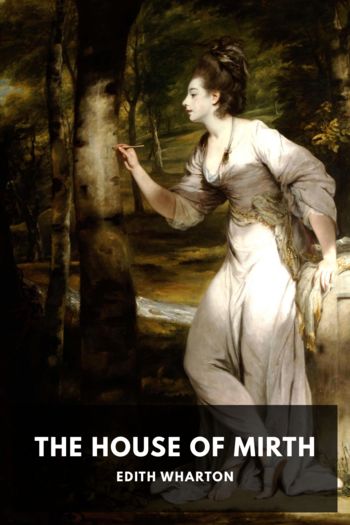The Age of Innocence - Edith Wharton (8 ebook reader .txt) 📗

- Author: Edith Wharton
Book online «The Age of Innocence - Edith Wharton (8 ebook reader .txt) 📗». Author Edith Wharton
No expense had been spared on the setting, which was acknowledged to be very beautiful even by people who shared his acquaintance with the Opera houses of Paris and Vienna. The foreground, to the footlights, was covered with emerald green cloth. In the middle distance symmetrical mounds of woolly green moss bounded by croquet hoops formed the base of shrubs shaped like orange-trees but studded with large pink and red roses. Gigantic pansies, considerably larger than the roses, and closely resembling the floral pen-wipers made by female parishioners for fashionable clergymen, sprang from the moss beneath the rose-trees; and here and there a daisy grafted on a rose-branch flowered with a luxuriance prophetic of Mr. Luther Burbank’s far-off prodigies.
In the centre of this enchanted garden Madame Nilsson, in white cashmere slashed with pale blue satin, a reticule dangling from a blue girdle, and large yellow braids carefully disposed on each side of her muslin chemisette, listened with downcast eyes to M. Capoul’s impassioned wooing, and affected a guileless incomprehension of his designs whenever, by word or glance, he persuasively indicated the ground floor window of the neat brick villa projecting obliquely from the right wing.
“The darling!” thought Newland Archer, his glance flitting back to the young girl with the lilies-of-the-valley. “She doesn’t even guess what it’s all about.” And he contemplated her absorbed young face with a thrill of possessorship in which pride in his own masculine initiation was mingled with a tender reverence for her abysmal purity. “We’ll read Faust together … by the Italian lakes …” he thought, somewhat hazily confusing the scene of his projected honeymoon with the masterpieces of literature which it would be his manly privilege to reveal to his bride. It was only that afternoon that May Welland had let him guess that she “cared” (New York’s consecrated phrase of maiden avowal), and already his imagination, leaping ahead of the engagement ring, the betrothal kiss and the march from Lohengrin, pictured her at his side in some scene of old European witchery.
He did not in the least wish the future Mrs. Newland Archer to be a simpleton. He meant her (thanks to his enlightening companionship) to develop a social tact and readiness of wit enabling her to hold her own with the most popular married women of the “younger set,” in which it was the recognised custom to attract masculine homage while playfully discouraging it. If he had probed to the bottom of his vanity (as he sometimes nearly did) he would have found there the wish that his wife should be as worldly-wise and as eager to please as the married lady whose charms had held his fancy through two mildly agitated years; without, of course, any hint of the frailty which had so nearly marred that unhappy being’s life, and had disarranged his own plans for a whole winter.
How this miracle of fire and ice was to be created, and to sustain itself in a harsh world, he had never taken the time to think out; but he was content to hold his view without analysing it, since he knew it was that of all the carefully-brushed, white-waistcoated, buttonhole-flowered gentlemen who succeeded each other in the club box, exchanged friendly greetings with him, and turned their opera-glasses critically on the circle of ladies who were the product of the system. In matters intellectual and artistic Newland Archer felt himself distinctly the superior of these chosen specimens of old New York gentility; he had probably read more, thought more, and even seen a good deal more of the world, than any other man of the number. Singly they betrayed their inferiority; but grouped together they represented “New York,” and the habit of masculine solidarity made him accept their doctrine on all the issues called moral. He instinctively felt that in this respect it would be troublesome—and also rather bad form—to strike out for himself.
“Well—upon my soul!” exclaimed Lawrence Lefferts, turning his opera-glass abruptly away from the stage. Lawrence Lefferts was, on the whole, the foremost authority on “form” in New York. He had probably devoted more time than anyone else to the study of this intricate and fascinating question; but study alone could not account for his complete and easy competence. One had only to look at him, from the slant of his bald forehead and the curve of his beautiful fair moustache to the long patent-leather feet at the other end of his lean and elegant person, to feel that the knowledge of “form” must be congenital in anyone who knew how to wear such good clothes so carelessly and carry such height with so much lounging grace. As a young admirer had once said of him: “If anybody can tell a fellow just when to wear a black tie with evening clothes and when not to, it’s Larry Lefferts.” And on the question of pumps versus patent-leather “Oxfords” his authority had never been disputed.
“My God!” he





Comments (0)